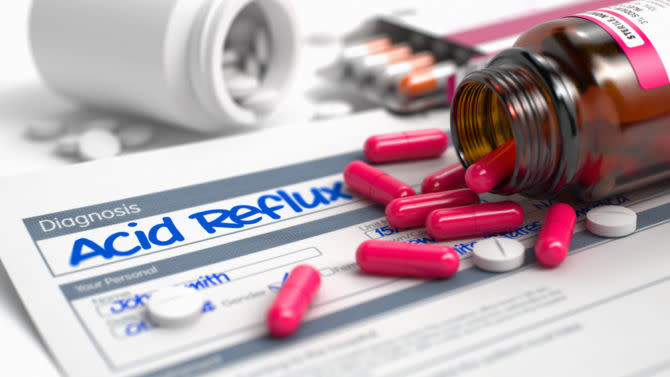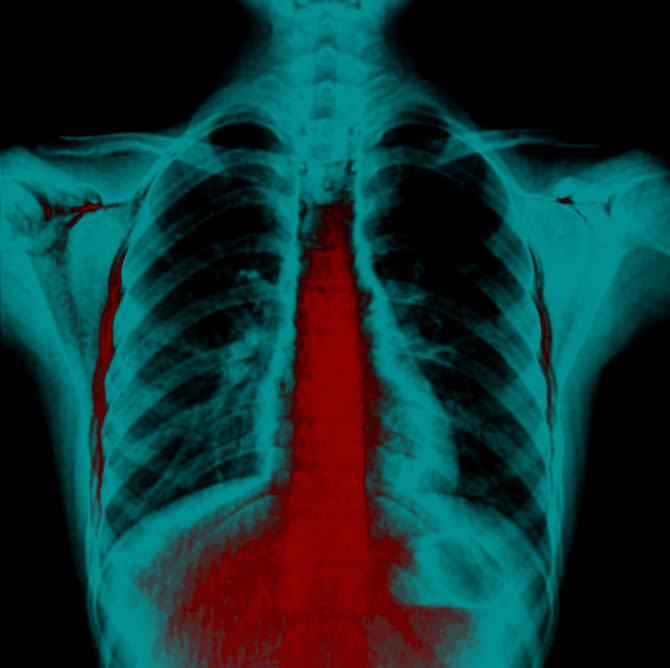Antacid Drugs And Strokes: That Little Purple Pill Could Be Deadly
Antacid drugs may increase your risk of suffering a stroke, especially if you take a higher or prolonged dose.
Antacid drugs are taken by millions of Americans to quell the unsettling chest discomfort of heartburn and the unpleasant bile-tinged flavor that bubbles far enough up the esophagus to taunt the taste buds. According to the National Institute of Diabetes and Digestive and Kidney Diseases, approximately 20 percent of the United States population is stricken with gastroesophageal reflux disease, or GERD. While physicians do write prescriptions for various antacid drugs, many of these popular remedies are now available without a prescription. This over-the-counter availability has enabled individuals to self-medicate their bouts of acid reflux, which may be putting them in danger of having strokes in their futures.
Antacid drugs and strokes have been linked in a Danish study, the results of which were announced last week at the American Heart Association’s annual conference in New Orleans. The study found that a particular class of antacid medications increased a patient’s risk for a particular type of stroke when taken at a high dose.
The bad news is that the particular class of antacid drugs happens to cover those most commonly taken. Known as proton pump inhibitors, these medications treat acid reflux by reducing the amount of acid produced in the stomach. Proton pump inhibitor drugs include omeprazole (Prilosec), lansoprazole (Prevacid), esomeprazole (Nexium), and pantoprazole (Protonix). For more bad news, research linked these antacid drugs and strokes, specifically ischemic stroke. According to the Centers for Disease Control and Prevention, ischemic strokes are the most commonly occurring type of stroke. An ischemic stroke is caused by a blood clot that blocks an artery to the brain, cutting off the brain’s supply of oxygenated blood.

According to the American Heart Association, proton pump inhibitors have been associated with increased risks for heart attacks, dementia, and kidney disease in previous studies. The recent Danish study, headed by Dr. Thomas Sehested, revealed that the antacid drugs also increase the risk of stroke by 21 percent. The study showed a significantly higher risk for patients who took the highest doses of lansoprazole and pantoprazole. Those who took the lowest dose of proton pump inhibitors had little to no increase in risk. According to CNN, some pharmaceutical companies who manufacture antacid drugs defended their products, while others declined to comment on the study’s findings.
If you happen to take an H2 blocker to treat your acid reflux, you might fare better in the long run. This class of antacid drugs showed no increase for stroke in the study. Like proton pump inhibitors, H2 blockers reduce the amount of acid produced in the stomach. The difference between the two is that proton pump inhibitors block the proton pumps in the stomach, while H2 blockers block histamine receptors in the stomach. H2 blockers include cimetidine (Tagamet), famotidine (Pepcid), and ranitidine (Zantac).
While the results of the study are preliminary, Dr. Sehested theorizes that the antacid drug and stroke connection may be the result of biochemical reductions that occur with proton pump inhibitor use and that are essential for maintaining blood vessels and preventing hardening of the arteries.
Dr. Sehested hopes that the preliminary findings will serve as a call to action for physicians to exercise more caution when recommending remedies that were once believed to be safe, especially in light of the fact that many of them can now be purchased over the counter.
“At one time, PPIs were thought to be safe, without major side effects, this study further questions the cardiovascular safety of these drugs.”
With the ease of antacid drug procurement, too many individuals may be taking medications that they actually do not need. In their desperate attempts to ease their symptoms, many are taking these drugs for longer than recommended and at higher doses, ultimately putting their cardiovascular health in jeopardy. If you are experiencing any gastrointestinal symptoms or signs that you are dismissing as heartburn, be sure to consult with your physician to rule out other possible causes and to discuss the use of antacid drugs before you trek to your neighborhood drug store.

Today’s bustling society demands fast and easy relief, which many seek in the form of a pill. Taking a pill to combat one problem can often lead to more detrimental problems, however. Instead of turning to the little purple pill to treat acid reflux flareups, WebMD recommends relieving your condition with natural lifestyle changes. Some changes are challenging, such as kicking the smoking habit, while others are easy, such as eating smaller meals more frequently throughout your day. No matter how much effort these changes will require, knowing that your antacid drugs might be increasing your risk for a debilitating and potentially fatal stroke should make that pill a lot harder to swallow.
[Featured Image by Don Nichols/iStock]
Antacid Drugs And Strokes: That Little Purple Pill Could Be Deadly is an article from: The Inquisitr News



